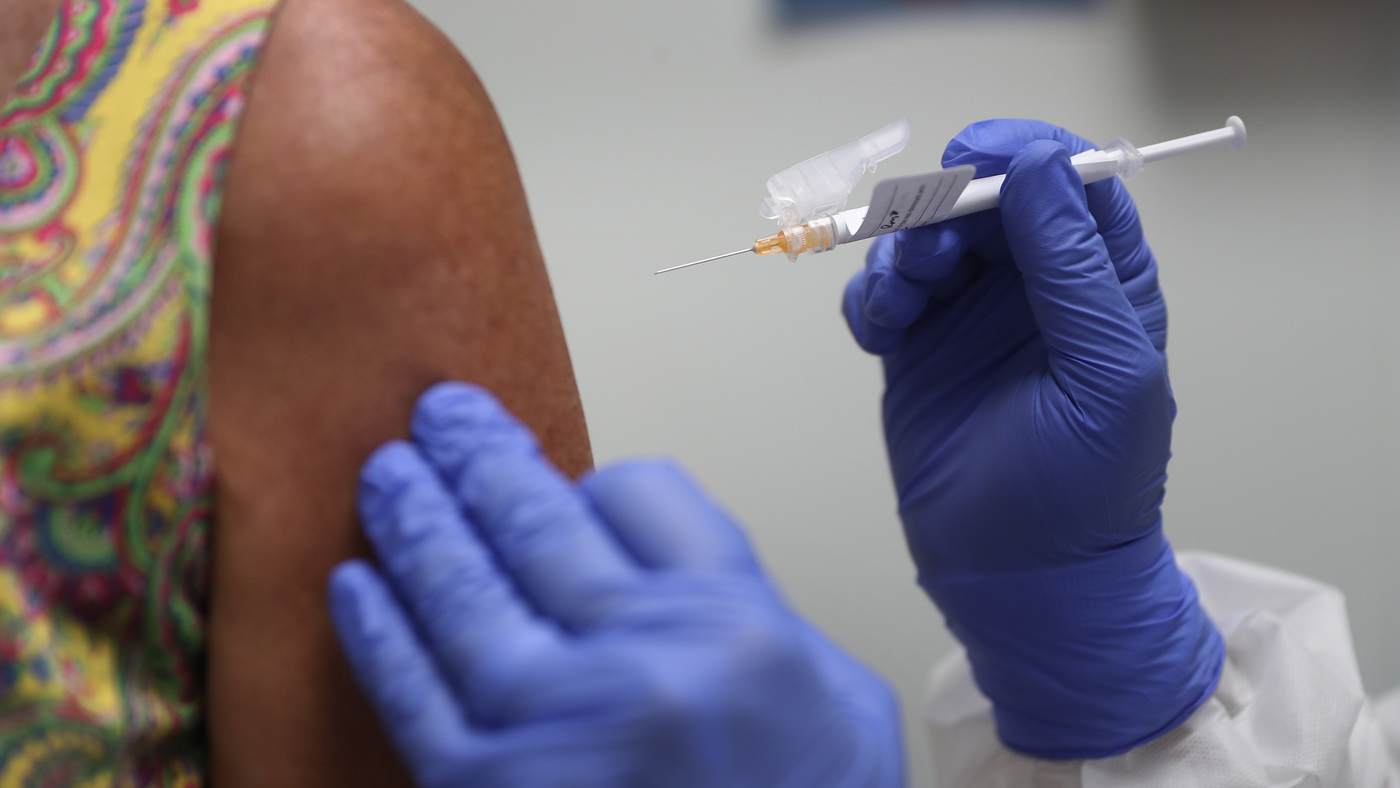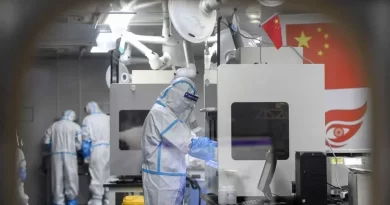Coronavirus Vaccine Trials Continue Along With Skepticism From Americans : Consider This from NPR

AUDIE CORNISH, HOST:
Pfizer, Johnson & Johnson and GlaxoSmithKline are some of the biggest drug companies in the world – we’re talking multibillion-dollar operations – companies not exactly known for playing nice with each other.
(SOUNDBITE OF ARCHIVED RECORDING)
UNIDENTIFIED REPORTER: This morning, a major development in the race to produce a coronavirus vaccine and something very unprecedented – some of the country’s most well-known drugmakers now presenting a united front, saying…
CORNISH: This week, nine drug companies, including the ones we just mentioned, took the unusual step of banding together to say…
(SOUNDBITE OF ARCHIVED RECORDING)
ALBERT BOURLA: With increasing public concerns about the processes that we are using to develop this vaccine and even more importantly the processes that will be used to evaluate these vaccines, we saw it as critical to come out and reiterate our commitment.
CORNISH: That’s Pfizer CEO Albert Bourla. That commitment – a pledge not to submit a coronavirus vaccine for FDA review unless it’s been shown to be safe and effective in large clinical trials. And that may sound obvious and also backwards. Like, you’d expect the government to be the cautious party here and the drug companies to move fast. But in fact, there’s growing concern the Trump administration is in a hurry to get a vaccine out the door before Election Day.
(SOUNDBITE OF ARCHIVED RECORDING)
PRESIDENT DONALD TRUMP: So we’re going to have a vaccine very soon, maybe even before a very special date. You know what date I’m talking about.
CORNISH: CONSIDER THIS. Hopes for a coronavirus vaccine are high, but trust in the process to develop one is less so. From NPR, I’m Audie Cornish. It’s Thursday, September 10.
(SOUNDBITE OF MUSIC)
CORNISH: It’s CONSIDER THIS FROM NPR. And first things first, the chief adviser for Operation Warp Speed – that’s the Trump administration’s vaccine development program – is Moncef Slaoui. He told NPR just last week a vaccine before Election Day is probably not in the cards.
(SOUNDBITE OF ARCHIVED NPR BROADCAST)
MONCEF SLAOUI: There is a very, very low chance that the trials that are running as we speak could read before the end of October.
CORNISH: Vaccine trials happening now involve tens of thousands of people being studied all over the country and around the world. They’re incredibly complicated and usually take years. Just this week, one drug company, AstraZeneca, paused its vaccine trials because of an unexplained illness in one volunteer.
(SOUNDBITE OF ARCHIVED RECORDING)
FRANCIS COLLINS: To have a clinical hold, as has been placed on AstraZeneca as of yesterday because of a single serious adverse event, is not at all unprecedented.
CORNISH: NIH Director Francis Collins told a Senate Committee on Wednesday this kind of thing happens in vaccine development. The key is to figure out if the vaccine caused the illness or if the volunteer would have gotten sick anyway.
(SOUNDBITE OF ARCHIVED RECORDING)
COLLINS: So this ought to be reassuring to everybody listening when we say we are going to focus first on safety and make no compromises. Here is Exhibit A about how that is happening in practice.
CORNISH: Which brings us back to that pledge from the drug companies to focus on safety.
(SOUNDBITE OF ARCHIVED NPR BROADCAST)
AMEET SARPATWARI: I think it reflects an acknowledgment of the widespread concern that FDA decisions are currently being guided by politics and not science.
CORNISH: Ameet Sarpatwari is the assistant director of the Program on Regulation, Therapeutics and Law at Harvard Medical School. He told NPR correspondent Sydney Lupkin companies did not pledge this week to complete their trials before moving forward, meaning they could still use partial data to argue a vaccine is safe and effective. And they stopped short of promising to share study data with the public in a timely manner.
(SOUNDBITE OF ARCHIVED NPR BROADCAST)
SARPATWARI: In the grand scheme of things, I don’t think it moves the needle that much.
CORNISH: Whether or not the promise from drug companies moves the needle, the issue of vaccine development has moved into the presidential campaign.
(SOUNDBITE OF ARCHIVED RECORDING)
JOE BIDEN: I got asked the question, if the president announced tomorrow we have a vaccine, would you take it? Only if it was completely transparent that other experts in the country could look at it.
CORNISH: Vice President Joe Biden has started to argue in campaign stops this week that the Trump administration has undermined public confidence in the vaccine development process.
(SOUNDBITE OF ARCHIVED RECORDING)
KAMALA HARRIS: I think that’s going to be an issue for all of us.
CORNISH: Asked on CNN if she would take a vaccine announced by the Trump administration before the election, Biden’s running mate, Kamala Harris, said…
(SOUNDBITE OF ARCHIVED RECORDING)
HARRIS: I will not take his word for it. He wants us to inject bleach. I – no, I will not take his word.
(SOUNDBITE OF MUSIC)
CORNISH: The question is, what if trust in a vaccine becomes just another issue that divides Americans along political lines? Already a Gallup poll last month found that more than 1 in 3 Americans would not get such a vaccine even if it was approved by the FDA.
(SOUNDBITE OF ARCHIVED NPR BROADCAST)
DOLORES ALBARRACIN: Well, 1 in 3 is concerning, especially because we know people do not always do what they intend. So even among the other two-thirds, you’re still going to get people who are not going to get vaccinated.
CORNISH: Dolores Albarracin studies behavior and medicine at the University of Illinois at Urbana-Champaign. We spoke about why some people are skeptical about vaccines.
(SOUNDBITE OF ARCHIVED NPR BROADCAST)
ALBARRACIN: Among those who hesitate, 60% fear side effects, 37% are not afraid – they just don’t think it will work. And then you have 20% who are just staunch opposers, sort of the anti-vax group. And that’s a small group.
CORNISH: I was going to ask you about that, right? I mean, there’s a robust anti-vax movement still in the United States. So are some of these fears dovetailing off of the narrative in that community?
ALBARRACIN: Yes, very much so. That community, we know, has been active for quite some time in recent years. This has been predominantly online via social media. And we have data even showing that exposure to social media earlier on actually predicts vaccination intentions in the domain of flu later on. So there’s pretty good data that those groups are not trivial. But…
CORNISH: Wait. So help me understand this.
ALBARRACIN: Yes.
CORNISH: Essentially, if someone sees anti-vaccination social media posts, that can actually influence their own decision about whether or not to accept a vaccine.
ALBARRACIN: Yes – less likely to get the flu shot a few months later, except they are not affected if they have discussions in real life. So if they can discuss this information with friends, family, their physicians, then they are less persuaded by the misinformation. But otherwise, the misinformation they encounter affects them.
CORNISH: So what should the approach be overall to convince people that the coronavirus vaccine will be safe and necessary to get and – or am I jumping the gun?
ALBARRACIN: So here I think you’re looking at wanting to communicate a norm that others want the vaccine. We must get it – so something quite different from what we saw with wearing masks where there was a lot more hesitation in the messaging – right? – and contradictions over months – so clear norm. You also need to be, of course, correcting for misinformation – systematically, every day, through health education in schools, at work – everywhere. If we don’t eradicate it, it will make it very difficult to end the COVID-19 pandemic.
(SOUNDBITE OF MUSIC)
CORNISH: Dolores Albarracin – she’s a professor at the University of Illinois at Urbana-Champaign.
Now, while there are a certain number of people skeptical of a coronavirus vaccine, it doesn’t seem like many of those people work on Wall Street. Each time a new vaccine trial phase is announced or a new scientific hurdle is cleared, drug company stock goes up. And an NPR investigation has found at one company, Moderna, executives took advantage of those rising stock prices.
Moderna is developing one of the leading vaccine candidates. Their stock prices roughly doubled in value since the spring. And since June, executives there have sold more than $90 million worth of stock. NPR’s Tom Dreisbach reported on why that’s a little irregular. He spoke to my colleague Sacha Pfeiffer.
(SOUNDBITE OF ARCHIVED NPR BROADCAST)
SACHA PFEIFFER: Would you first catch us up on the backstory here?
TOM DREISBACH: Sure. So Moderna’s working with scientists from the National Institute of Allergy and Infectious Diseases, which is led by Dr. Anthony Fauci. And in May, Moderna released early results from its phase one vaccine trial, which showed some really positive news. Right after that, the stock price went way up, and people started noticing that executives at the company were selling tens of millions of dollars’ worth of their stock. That led to a lot of criticism, and the head of the Securities and Exchange Commission even questioned it.
PFEIFFER: But of course, executives buy and sell stock in their companies all the time. So what’s…
DREISBACH: Right.
PFEIFFER: …Behind the criticism in this case?
DREISBACH: Well, for one thing, Moderna’s gotten about $2.5 billion in government money to develop its vaccine. And so that’s a big reason why the company’s stock price has gone up so much.
I spoke to Margarida Jorge. She’s with the advocacy group Lower Drug Prices Now.
MARGARIDA JORGE: The insiders are making plenty of profit, and they’re mostly doing it with our money.
DREISBACH: And she points out the Moderna vaccine may not even work, but executives are profiting whether it does or not. Now, the company says Moderna scientists spent a decade developing this technology with private investment. That put them in a position where they could work with the government on a vaccine. Now, another criticism is that two Moderna executives, including the chief medical officer, have sold all of their stock in the company. They currently own no direct shares.
PFEIFFER: Is there an expectation that they would’ve kept some of their shares?
DREISBACH: Yeah, there’s generally this idea that executives should have what’s known as skin in the game. And people might wonder, you know, if you’re so confident in this vaccine, wouldn’t you hold onto your stock? After all, if it’s safe and effective, the company’s stock could go even higher. And there is one other concern, which is around the specific timing of these stock sales.
PFEIFFER: Now, the company says its executives scheduled these stock trades a while ago, long before they could’ve known their stock would go way up. But you found some irregularities. Tell us what you found.
DREISBACH: Right. So to make these stock sales, company executives set up what are – these schedules in advance, kind of put them on autopilot – set it and forget it. You’re only allowed to set up the schedule, though, when you don’t have confidential inside information that could affect the share price. That way, you can’t be accused of insider trading. And like you said, the company’s CEO has said in interviews, look; we set these plans up almost two years ago.
But we looked through the official government disclosures, and it turns out they made changes to those plans or adopted new plans this year. In one case, the chief medical officer made changes to his plan one day before the company officially announced it was working on a coronavirus vaccine. In another case, three executives started a new schedule for their stock trades on a Friday. And then the following Monday, the company announced a new milestone in its vaccine development.
PFEIFFER: And that timing clearly raises the question of whether they had inside information when they made those changes.
DREISBACH: Exactly. I talked to a professor at Wharton who is also an expert in insider trading. His name is Daniel Taylor. And he told me that this type of trading behavior is just far outside the norm.
DANIEL TAYLOR: On a scale of 1 to 10, 1 being least concerned and 10 being the most concerned, this is an 11. At a minimum, you have weak internal controls over trading activity, and at worst, it’s something nefarious. In either case, it’s not good.
DREISBACH: Now, I spoke to Moderna about this. A spokesperson said, quote, “The individuals entering into these plans and the company were not in possession of material non-public information based on an assessment by the legal counsel of the facts available at that time.” The company says it strictly follows all of the rules and the laws and SEC guidelines. But in August, the company did say, to avoid any distraction, it will no longer make any changes to these stock trading plans until they finish the vaccine project.
(SOUNDBITE OF MUSIC)
CORNISH: NPR’s Tom Dreisbach. Read more of his reporting on Moderna at the link in our episode notes. It’s CONSIDER THIS FROM NPR. I’m Audie Cornish.
Copyright © 2020 NPR. All rights reserved. Visit our website terms of use and permissions pages at www.npr.org for further information.
NPR transcripts are created on a rush deadline by Verb8tm, Inc., an NPR contractor, and produced using a proprietary transcription process developed with NPR. This text may not be in its final form and may be updated or revised in the future. Accuracy and availability may vary. The authoritative record of NPR’s programming is the audio record.
*** This article has been archived for your research. The original version from NPR can be found here ***


